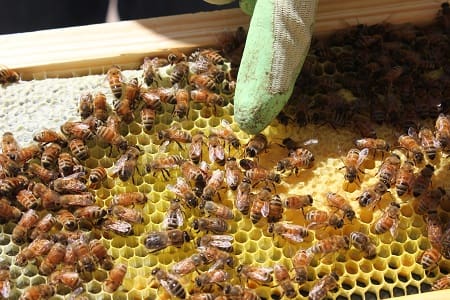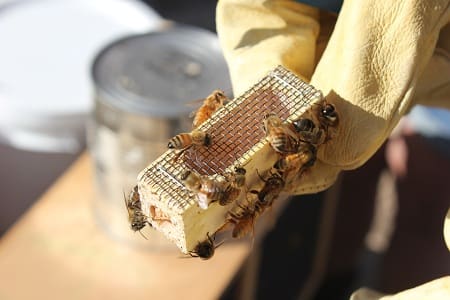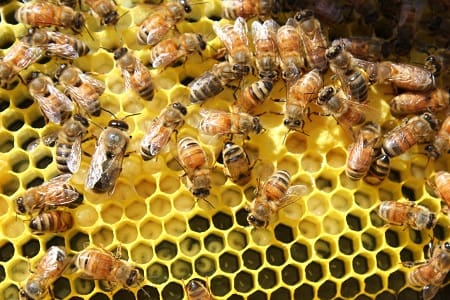 He has now taken to beekeeping in full force. “I retired from active duty military back in 2000 after some 29 year and moved to Eagle Mountain in January 2002. I became a beekeeper that same year to have a healthy productive garden. In 2003 I joined Utah County Beekeepers Association. After a few years I found myself as President of the association. After a few years I stepped down from that post and since then I been on the Board of Directors of the association. I still remain an active member of UCBA, and teach beginning beekeeping and other classes for the association. I have taught beekeeping at other locations as far north as the Ogden Nature Center. A few years ago I had about 40 hives in the Utah Valley area but I am getting older and I have cut back to about 5 hives keep locally.”
For almost last 10 years, Stephen makes a trip to Northern California for his love of beekeeping. He returns to Utah with 50 packages of bees from a supplier that has been in business for over 110 years. Those packages are for his hives, members of UCBA, and local people who wish to purchase them. I purchased two packages from him this year, and have purchased packages in the past as well. A package usually consists of 2-3 lbs of bees, each pound contains roughly 3500 bees, and a queen. Stephen is not like all suppliers, he takes it to the next level, “I noticed that some people were loosing their bees shortly after buying them from other suppliers. New packages are fragile and if there was a cold snap they would freeze. I therefore started bring them in during the first week in May, about 3 to 4 weeks after other suppliers, as there was less of a chance of a good freeze. The bees have a better survival rate due to warmer weather and more nectar sources. To add to that I furnished a protein patty as part of the package price to insure better nutrition and faster buildup. Since most of my customers are fairly new beekeepers the packages include a marked queen. This allows the newer beekeeper to identify their queen. To my knowledge I am the only Utah bee supplier that furnishes these two items to their packages at no additional costs. I want my beekeepers to be successful.” He continues, “I take great joy in helping others started in beekeeping and have mentored many people that wanted to be a beekeeper. I have also supported the Be A Beekeeper (BAB) program of the UCBA. It is a program that starts junior beekeepers (ages 8 to 18) in beekeeping. For more than ten years I have furnished the program with materials for building hives and all their equipment. This is totally free and is funded from my profits selling bees and hives. Again it is great watching these kids learn and grow raising bees and reporting at meetings and talking to people at various fairs.”
He has now taken to beekeeping in full force. “I retired from active duty military back in 2000 after some 29 year and moved to Eagle Mountain in January 2002. I became a beekeeper that same year to have a healthy productive garden. In 2003 I joined Utah County Beekeepers Association. After a few years I found myself as President of the association. After a few years I stepped down from that post and since then I been on the Board of Directors of the association. I still remain an active member of UCBA, and teach beginning beekeeping and other classes for the association. I have taught beekeeping at other locations as far north as the Ogden Nature Center. A few years ago I had about 40 hives in the Utah Valley area but I am getting older and I have cut back to about 5 hives keep locally.”
For almost last 10 years, Stephen makes a trip to Northern California for his love of beekeeping. He returns to Utah with 50 packages of bees from a supplier that has been in business for over 110 years. Those packages are for his hives, members of UCBA, and local people who wish to purchase them. I purchased two packages from him this year, and have purchased packages in the past as well. A package usually consists of 2-3 lbs of bees, each pound contains roughly 3500 bees, and a queen. Stephen is not like all suppliers, he takes it to the next level, “I noticed that some people were loosing their bees shortly after buying them from other suppliers. New packages are fragile and if there was a cold snap they would freeze. I therefore started bring them in during the first week in May, about 3 to 4 weeks after other suppliers, as there was less of a chance of a good freeze. The bees have a better survival rate due to warmer weather and more nectar sources. To add to that I furnished a protein patty as part of the package price to insure better nutrition and faster buildup. Since most of my customers are fairly new beekeepers the packages include a marked queen. This allows the newer beekeeper to identify their queen. To my knowledge I am the only Utah bee supplier that furnishes these two items to their packages at no additional costs. I want my beekeepers to be successful.” He continues, “I take great joy in helping others started in beekeeping and have mentored many people that wanted to be a beekeeper. I have also supported the Be A Beekeeper (BAB) program of the UCBA. It is a program that starts junior beekeepers (ages 8 to 18) in beekeeping. For more than ten years I have furnished the program with materials for building hives and all their equipment. This is totally free and is funded from my profits selling bees and hives. Again it is great watching these kids learn and grow raising bees and reporting at meetings and talking to people at various fairs.”


Mike Kieffer is an IT geek by hobby and trade, with a BS in Information Systems & Technology. He is a proud father of 10, a grandpa, an author, a journalist, and internet publisher. His motto is to “Elevate, Inspire and Inform”, and he is politically conservative and a Christian. Mike has a passion for technology, writing, and helping others. With a wealth of experience, he is committed to sharing his knowledge with others to help them reach their full potential. He is known for his jackassery or his form of self-expression that encourages boldness, creativity, and risk-taking. It can be a way to push the boundaries and challenge traditional norms, leading to creative solutions and positive change.
